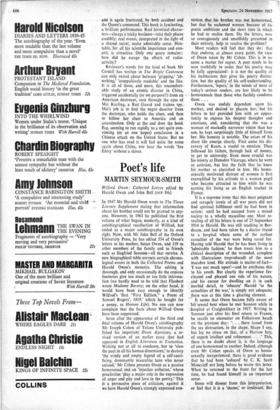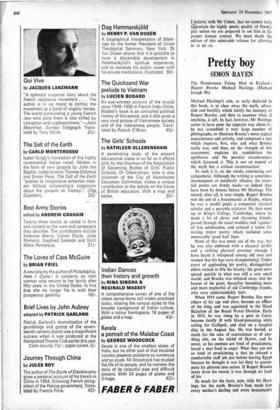Poet's life
MARTIN SEYMOUR-SMITH
In 1947 Mr Harold Owen wrote to The Times Literary Supplement stating that information about his brother could not be granted to any- one. However, in 1963 he published the first volume of what began, modestly, as a kind of autobiographical recollection of Wilfred, but ended as a major autobiography in its own right. Now, with Mr John Bell of the Oxford University Press, he has edited 554 of Owen's letters to his mother, Susan Owen, and 119 to other members of the family and to friends such as Siegfried Sassoon—all that survive. A new biographical table corrects certain chrono- logical errors in both the Collected Poems and Harold Owen's memoirs. The editing is thorough, and only occasionally do the copious footnotes give too much or too little informa- tion (we hardly need to be told that Flaubert wrote Madame Bovary; on the other hand, it would have been easy enough to identify Wilfred's 'first "First Edition," a Poem of Samuel Rogers', 1819,' which he bought for a penny, as Human Life). No one can now complain that the facts about Wilfred Owen have been suppressed.
Soon after the appearance of the third and final volume of Harold Owen's autobiography Mr Joseph Cohen of Tulane University pub- lished his important Owen Agonistes, a re- vised version of an earlier essay that had appeared in English Literature in Transition. Wishing not at all to condemn, but to 'view the poet in all his human dimensions,' to destroy 'the windy and empty legend of a self-sacri- ficing, dominantly masculine hero who never existed,' Mr Cohen presents Owen as a passive homosexual and an 'injustice collector,' whose proclivities 'play a major role in the expression of anger and pity and love in the poetry.'-This is a persuasive piece of criticism; against it we have Harold Owen's strongly expressed con- viction that his brother was not homosexual, but that he eschewed women because of his poetic ambitions and the short time in which he had to realise them. Do the letters, now so courageously and unselfishly presented in their entirety, help to resolve the problem?
Most readers will feel that they do : that they endorse, at almost every point, the view of Owen taken by Mr Cohen. This is in no sense a matter for regret. A poet needs to be seen truthfully in order that his poetry may be fully appreciated: it is not the quality of his inclinations that gives his poetry distinc- tion, but the quality of his self-understanding. Furthermore, 'lepers,' in the minds of most of today's serious readers, are less likely to be homosexuals than those who facilely condemn them . . .
Owen was unduly dependent upon his mother, and desired to placate her; - but his letters to her provided him with an oppor- tunity to express his deepest thoughts and emotions, and, considering that she was a woman of markedly narrower vision than her son, he kept surprisingly little of himself from her. His honesty is notable. The crises of his short life emerge clearly. First came his dis- covery of Keats, a model to emulate. Then followed his failure, through lack of money, to get to university. Even more crucial was his misery at Dunsden Vicarage, where he went as assistant, but lost the faith that he knew his mother so cherished in him. His homo- sexually motivated distrust of women is first exemplified by his attitude to a woman pupil who became attracted to him while he was earning his living as an English teacher in France.
It is a supreme irony that this most poignant and savagely ironic of all war poets did not find spiritual fulfilment until he had been in action: until he had escaped from a mixed society to a wholly masculine one. Most re- vealing of all his letters is one of 23 September 1914 to Harold. He was still teaching in Bor- deaux, and had been taken by a doctor friend to a hospital where some of the earliest casualties of the war were being cared for. Having told Harold that he has been living in `admirable fashion,' he then treats him to a clinical description of the wounded, complete with illustrations (reproduced) of the most macabre kind. His attitude is matter-of-fact— 'I was not much upset'—and he attributes this to his youth. But clearly the experience fas- cinated and pleased one side of his nature, and his excuse for dwelling on it in such morbid detail, to 'educate' Harold `to the actualities of the war,' is simply not adequate; there was at this time a gloating element.
It seems that Owen became fully aware of hid sexual bent when he met Sassoon while in ;hospital at Craiglockhart in 1917. Writing to Sassoon just after his final return to France, he recalls an encounter on Folkestone beach
on the previous day: . . there issued from the sea distraction, in the shape, Shape I say, but lay no stress on that, of a Harrow boy, of superb intellect and refinement. . . .' This, there is no doubt about it, is the language of one homosexual to another. Indeed, although even Mr Cohen speaks of Owen as homo- sexually inexperienced, there is good evidence that he had been 'seduced' by C. K. Scott • Moncrieff not long before he wrote this letter. When he returned to the front for the last time, be bad found himself in an important sense.
Some will dissent from this interpretation, or feel that it is a 'shame,' or irrelevant. But I believe, with Mr Cohen, that we cannot truly appreciate the highly poetic quality of Owen's pity unless we are prepared to see him in his proper human context. We must thank the editors of this admirable volume for allowing us to do so.















































 Previous page
Previous page